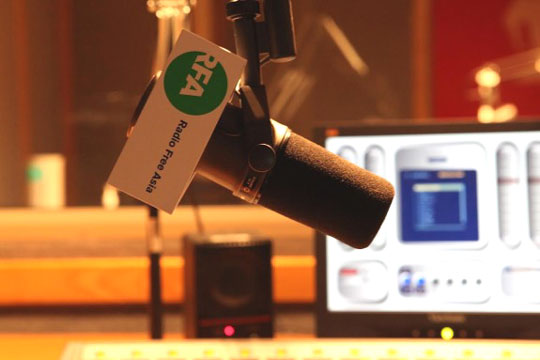by WorldTribune Staff, June 13, 2017
The Trump administration’s plan to slash $4.5 million from Radio Free Asia’s budget came under fire for cuts to the pro-democracy Chinese language broadcasts at a time when Beijing has sharply increased its propaganda activities against U.S. interests and allies.
“China’s propaganda and censorship efforts are growing, and now even reach into the United States,” Sen. Marco Rubio, Florida Republican, said. “We need to smartly invest in countering these efforts so that China’s authoritarians do not gain a strategic advantage in the battle of ideas.”
 In a social media post, security correspondent Bill Gertz said: “As China ramps up info war against the US, Trump wants to cut Radio Free Asia broadcasts to China. What?”
In a social media post, security correspondent Bill Gertz said: “As China ramps up info war against the US, Trump wants to cut Radio Free Asia broadcasts to China. What?”
The Broadcasting Board of Governors (BBG), the government entity that is the parent organization of Radio Free Asia, (RFA), said the proposed budget cut is “in keeping with President Trump’s focus on streamlining government expenses.”
RFA, a semi-official radio station is devoted to promoting democracy and freedom in China and Asia, broadcasts in Burmese, Cantonese, Khmer, Korean, Lao, Mandarin, Tibetan, Uyghur, and Vietnamese on shortwave, medium wave, satellite, television, and the Internet.
“RFA will continue to focus on Mandarin through social media which is the platform the agency has determined to be most cost-effective,” the BBG said in a statement to the Washington Free Beacon.
“RFA is an authoritative source of East and Southeast Asian news, and will continue to substitute for domestic media in Asian countries that prevent or restrict freedom of the press,” the board said.
RFA President Libby Liu said in a statement: “I’m really proud of the work done by Radio Free Asia’s Mandarin service in bringing incisive news and uncensored perspectives to China. We hear from Chinese listeners every day who are yearning to know more about events happening in their country that China’s state-controlled media either chooses to ignore or misrepresent.”
Rep. Ed Royce, chairman of the House Foreign Affairs Committee that oversees the BBG budget, said he wants RFA to continue broadcasting in Mandarin.
“As long as Beijing’s Internet firewall blocks sites including RFA and VOA, we should continue funding Mandarin radio service,” Royce said, adding that he would “rather see the BBG find cost savings by cutting bloated bureaucracy in D.C.”
Voice of America (VOA), the more official U.S. government broadcaster, took a similar step in 2011, cutting off short-wave broadcasts into China during the Obama administration.
VOA came under fire from Congress recently for curtailing an interview with an exiled Chinese billionaire, Guo Wengui, who has been revealing high-level corruption among Chinese leaders.
Retired Navy Capt. Jim Fanell, a former Pacific Fleet intelligence chief, said the Trump administration should bolster both RFA and VOA broadcasts that are urgently needed to combat China’s approach to power politics. “Radio is a powerful application and we should not walk away from it,” he said.
“On a daily basis American citizens are bombarded with Chinese propaganda from state-owned media outlets like China Daily, People’s Daily, and Xinhua,” said Fanell.
“In order to keep up with and attempt to counter Beijing’s strategic narrative, venues like Radio Free Asia provide an assured method of communication to the citizens of China, something that Internet-based communications cannot do,” he added.
“The short-term savings of cutting Radio Free Asia’s Mandarin broadcasts can in no way mitigate the long-term damage to U.S. national security interests from the public broadcast of the truth of Beijing’s attack on freedom.”
Letters to the Editor __ Subscribe to Geostrategy-Direct __ Support Free Press Foundation
